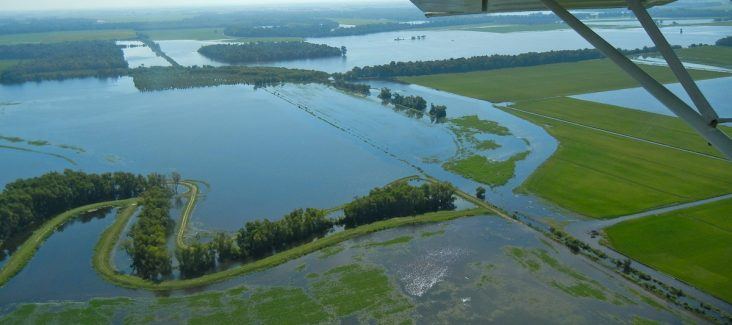Farmers may have to replant or delay planting in wake of historic floods
by April 7, 2025 3:34 pm 839 views

(Photo courtesy of Lauren Geurin)
Historic rainfall and multiple tornado outbreaks during the past several days damaged row crop fields throughout the Arkansas Delta region. From Wednesday (April 2) through Sunday (April 6), up to 1 foot of rain fell in some parts of the region, and all parts got 6 inches or more, according to the National Weather Service.
The influx of water has caused massive flooding along many rivers including the Black, White, Cache, St. Francis and others. Many row crop fields along these rivers are covered with water and will be for days, if not weeks.
What impact it will have on the planting season isn’t certain at this point, but many farmers will be repairing damaged fields, clearing ditches and some will likely have to replant their crops, according to Jeremy Ross, extension soybean agronomist for the University of Arkansas System Division of Agriculture.
“I told guys to hold off (on planting),” Ross said. “We’ll probably need to re-pull beds that have been freshly pulled.”
Last week’s Crop Progress report from the U.S. Department of Agriculture stated 22% of the state’s corn crop was planted and 3% had already emerged. Rice was 8%, with 1% emerged. Soybeans were 5% planted. Winter wheat, usually harvested in summer, was at 11% headed.
“There’s not much you can do with that much rain in a short amount of time,” said Scott Stiles, extension economics program associate for the Division of Agriculture. “You want to have all the ditches and pipes open.”
In Northeast Arkansas, “everybody around here has water furrows run — a good effort on drainage,” Stiles said.
“Backing up of the rivers, streams and bayous is the story,” said Jarrod Hardke, rice extension agronomist for the Division of Agriculture. “Low ground that’s already planted may be wiped out regardless of the crop planted there.”
Hardke said rice will survive the best, but levees will be the issue.
“They’ll get washed out and blown and have to be re-pulled and re-seeded,” he said. “Recently, planted corn and soybeans are in for a wild ride for survival. Cool temperatures may help buy them some time, but staying flooded or saturated for four-plus days is a bad recipe for emerging seedlings and fresh planted seed.”
The cotton and peanut growers plant later in the season and will be spared for the most part from this rain event, other than damaged fields that need to be repaired. That could cause delays in planting.
Stiles said for crop insurance purposes, April 1 is the earliest planting date for rice, with April 15 being the earliest planting date for soybeans.
“Rice or soybeans that have already been planted are not eligible for replant payments from crop insurance,” he said.
